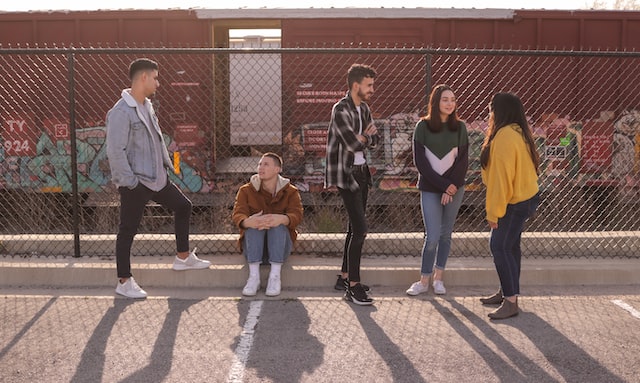Resources for promoting healthy relationships with young people
Thu 09 Apr 2015
For updated research and resources see our 2023 news story Relationship and sexuality education: media, research, resources and new campaign. The ...

For updated research and resources see our 2023 news story Relationship and sexuality education: media, research, resources and new campaign.
The New Zealand Family Violence Clearinghouse has compiled some resources on promoting healthy relationships, relevant for working with young people. These include resources on teen dating violence, consent, and promoting healthy relationships. This follows further publicity on the so-called "Roast Busters."
(Please note the are many resources available and this is not intended to be a comprehensive list, or to represent endorsement of the content by the Clearinghouse.)
Aotearoa New Zealand
Resources
The Ministry of Education published updated guidelines to support schools in identifying and choosing evidenced-based healthy relationship education programmes in 2015.
ACC has developed a schools-based sexual and dating violence prevention programme, Mates and Dates. The programme was piloted and evaluated in 2014. The programme draws on local and international evidence related to effectiveness. Students participate in five, 50 minute sessions at each year level, with sessions building on the lessons of the previous year. It includes interactive activities such as roleplays, comics and a dissection of Robin Thicke's controversial music video Blurred Lines. The programme addresses friendships and relationships with family and whānau as well as dating relationships.
ACC has published a summary of a series of focus groups and individual interviews held with parents, teachers, guidance counsellors, youth workers, public health nurses and students to inform the development of the programme. The purpose was to find out: "what young people currently know about having healthy relationships, and how to prevent sexual and dating violence; what their experiences have been with learning about similar subjects at school; where else young people are getting information about relationships; and what all groups of people spoken to would like to see being taught on these subjects in schools."
New Zealand Police and the Sophie Elliot Foundation provide Loves-Me-Not, a healthy relationships programme for secondary school students.
The Sex'n'Respect website (by Auckland's Rape Prevention Education) provides information on respectful sex and relating for young people. Sex & Ethics is a sexual violence prevention programme delivered by Wellington's Sexual Abuse Prevention Network. Who are you? is a New Zealand toolkit for sexual violence prevention work with young people (including bystander interventions around alcohol).
Family Planning has recently published a new Teaching consent toolkit for secondary school teachers. It has the Ka puāwai, ka hiki ki te haere resource designed for use in sexuality education for Years 1 to 4. It also has resources on Healthy / Unhealthy relationships, It's about Mana posters and new support materials, and This isn't love, this is control resources.
More information on research, resources, te ao Māori approaches and more on the primary prevention of sexual violence are available on the TOAH-NNEST website.
Kidpower Teenpower Fullpower delivers Healthy Relationships, a programme developed with and for teens and adults with intellectual disabilities. It provides practical tools to build resiliency and to prevent bullying, violence and abuse. Evaluations of the programme are available in the Clearinghouse library.
Kidpower Teenpower Fullpower has also produced a Teenpower Violence Prevention Toolkit for mainstream youth, which has been evaluated.
People First New Zealand Ngā Tāngata Tuatahi runs Keeping Safe, Feeling Safe. The project aims to help people with a learning disability to keep safe and to feel safe in the community by preventing bullying, harassment and abuse.
The It's Not OK campaign has a range of campaign materials you can order, including a positive relationships quiz.
E Tu Whānau has resources, including for rangatahi, and a Charter of Commitment.
Pasefika Proud works with Pacific communities.
Research
Breaking the silence but keeping secrets: what young people want to address sexual violence (2013) was commissioned by HELP and Tu Wahine and carried out by Point Research. It aimed to identify the needs of young people aged 13 to 18 years affected by sexual abuse or assault and the pyscho-social service needs of young people who have experienced sexual abuse.
In 2013, Superu (formerly the Families Commission) published a rapid literature review to identify what works in school-based relationship education.
This built on School-based violence prevention programmes: A literature review (Hassall and Hanna, 2007) published by Auckland University of Technology.
Moana Eruera and Terry Dobbs carried out a research project working with rangatahi in Te Tai Tokerau. The report Taitamariki Māori kōrero about intimate partner relationships was published by Amokura Family Violence Prevention Consortium in 2010.
The journal Feminism & Pyschology has published an article Rethinking the concept of consent for anti-sexual violence activism and education (Beres, 2014) which explores how young adults conceptualise consent in relation to how they they talked about expressing a willingness to participate in sex.
University of Canterbury academics Tracy Clelland, Penni Cushman and Eva Brown Hajdukova say support for teachers is needed immediately if they are to have the knowledge and skills to ensure students develop respectful attitudes and positive relationships. They have been investigating knowledge and attitudes of students enrolled in a new undergraduate sexuality education course. They said "Every student we surveyed mentioned the need for compulsory sexuality education for years 1 to 13 school students."
International
Resources
Teen dating violence
February each year is Teen Dating Violence Awareness Month in the United States.
In 2016, the National Online Resource Center on Violence Against Women (VAWnet) updated their Special Collection Preventing and Responding to Teen Dating Violence. This "emphasizes collaborative and multilevel approaches to the prevention of and response to teen dating violence." Updates include new resources for teachers and school-based professionals and a section addressing adolescent relationship abuse for pregnancy prevention advocates and adolescent sexual health practitioners.
Futures Without Violence provides a range of resources and publications on violence prevention and young people, including guidelines, apps, tools and public policy solutions.
The National Criminal Justice Reference Service has compiled resources in a special feature on Teen Dating Violence Awareness.
More information on teen dating violence, including fact sheets and resources, can be found on the Centers for Disease Control and Prevention website.
Healthy relationships
The Love is Respect project (US) provides resources to engage, educate and empower young people to prevent and end abusive relationships. The website provides information and resources on healthy relationships and identifying unhealthy relationships.
The Washington State Coalition Against Domestic Violence has published Love Like This, a series exploring what a healthy relationship looks like. The website provides illustrations of "some typical situations that occur in relationships and giving examples of how to deal with them in a healthy, loving, and respectful way, as opposed to an abusive, controlling, or coercive way."
Consent
Rockstar Dinasour Pirate Princess blogger explains the concept of consent through the metaphor "hey, would you like a cup of tea?"
The YouTube clip Consent is not a child's game discusses consent and healthy relationship education for school-aged children, highlighting the need for the space for kids to talk about it.
Family Planning have collated their favourite graphics and illustrations on consent, including a YouTube video about consent from Charlie Is Cool.
Research
A review has found that addressing gender norms and power makes sexuality and HIV education programs more effective. The findings are reported in:
Haberland, N.A. (2015). The case for addressing gender and power in sexuality and HIV education: A comprehensive review of evaluation studies. International Perspectives on Sexual and Reproductive Health, 41(1), 31-42. doi:10.1363/410315
The National Institute of Justice (US) has published a Research in Brief, Teen dating violence: How peers can affect risk and protective factors (2014). It is based on the recognition that "teens shape each others' experiences across the spectrum of entering into and leaving violent romantic relationships."
The Journal of Adolescent Health has published a special edition on the Prevention of teen dating violence (2015). It includes articles on promoting healthy relationships, risk factors for youth, evaluations of different primary prevention programs, preventing revictimisation, and challenges and successes of prevention programme implementation.
Additional selected recent journal articles are below:
The Journal of Interpersonal Violence published the study The Effects of Adolescent Intimate Partner Violence on Women’s Educational Attainment and Earnings (Adams et al, 2013) which found women who experienced intimate partner violence (IPV) in adolescence obtained less education, which directly influenced their income in later life. The study recommends intervention strategies which span the life course to prevent IPV and promote educational and career development.
The journal Trauma, Violence & Abuse published an article An Examination of the Factors Related to Dating Violence Perpetration Among Young Men and Women and Associated Theoretical Explanations: A review of the literature (Dardis et al, 2014). The review specifically examines "sex similarities and differences in the correlates and predictors of DV perpetration and the utility of current theories to explain young men’s and women’s DV perpetration."
The Journal of Adolescent Health has published an article Sexuality Education: Emerging Trends in Evidence and Practice (Haberland & Rogow, 2015) which summarises the elements, effectiveness, quality and country-level coverage of comprehensive sexuality education, drawing from documents, reviews, meta-analyses of programme evaluations and situation analyses.
Media
More support needed for sexuality education, Media release: University of Canterbury, 10.03.2015
Porn culture warning to parents, Stuff, 21.02.2015
Rosie Batty launches anti-domestic violence app for young women, The Guardian, 15.02.2015
Rape culture, Media release: The Parenting Place, 11.12.2014
Sex issues drive pilot programme, The Northern Advocate, 09.12.2014
Sex Education: teaching kids about coercion and consent, Radio NZ, 08.12.2014
Teen views on sex concern educators, Bay of Plenty Times, 23.11.2014
Let's talk about sex ... and love, respect and consent, NZ Herald, 16.11.2014
State rejects sex ed changes, NZ Herald, 16.11.2014
Image: Always Kiss Me Goodnight by Courtney Carmody Licence: Creative Commons Attribution-ShareAlike 2.0 Generic (CC BY-SA 2.0)
Image: Courtney Carmody



